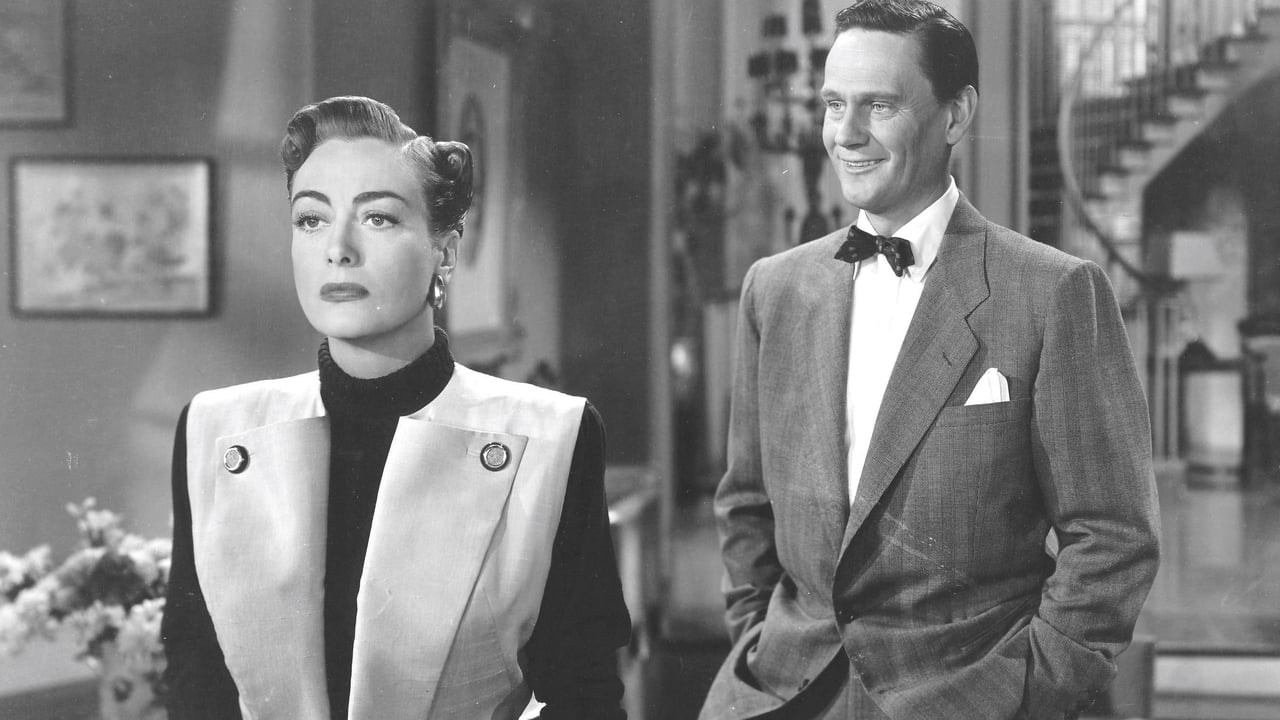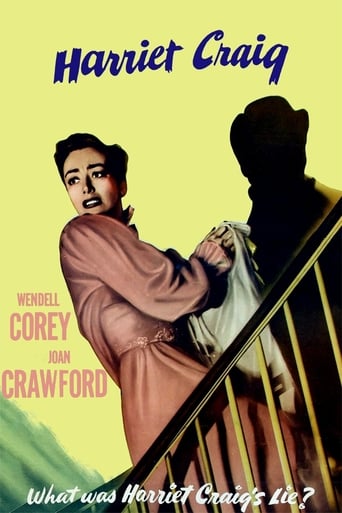

You won't be disappointed!
... View MoreGood films always raise compelling questions, whether the format is fiction or documentary fact.
... View MoreWorth seeing just to witness how winsome it is.
... View More.Like the great film, it's made with a great deal of visible affection both in front of and behind the camera.
... View MoreHere's Joan Crawford in full steam in the sort of overblown role that only she and Bette Davis (and maybe Susan Hayward – although she would play the character more sympathetically) could make halfway entertaining. Admittedly, Joan's not too flatteringly photographed here and her hair style is too severely swept back to be wholly attractive, but it certainly suits the non-compromising, selfish image of the altogether spoiled housewife that Crawford so enthusiastically – and with such dramatic relish – depicts. What I like about her performance too, is that Harriet is so perfectly consistent throughout: None of those last-minutes changes of heart that torpedo the TV soaps! Instead, we get honest-to-goodness self- centered reactions through and through. Also excellent in his role is Wendell Corey as the put-upon Craig. The rest of the players likewise excel. Everything seems suitably overblown. The direction is capable and all the crew are likewise efficient. Of course, it's just a soap after all and no more memorable than a well-polished endorsement of soap or cereal, but at least this movie is not compromised by a false ending and Crawford fans will definitely not be disappointed.
... View MoreEven Joan Crawford Haters Love this Movie. It is said to be one of the Closest Screen Characters to the Real Joan. At least According to Step-Daughter Christina and some other Tell-Alls, like Director Vincent Sherman. Here Monster Joan is Absolutely Unlikeable in a Role that is Manipulative, Domineering, Controlling, and just Completely Selfish. She Haunts the Palace as a Late Arriving "House" Wife Married more to the Domicile than Husband Wendell Corey.There are some Fine Supporting Performances but all Pale in Comparison to this Banshee Crawford, with Her Helmet-Hairdo and Ridiculous Power Clothes, always Lit Like a Ghostly Apparition with Nary a Smile, all Tight Lipped and Flashing Eyes.There are a Few Short Scenes and Lines of Dialog that are a Half-Hearted Try to Lend some Sympathy to this Partner from Hell, but Her Dark Side is so Powerful and All Encompassing that it is Useless and Barely Register after the House of Cards Tumble. Suffice to Say that when No One is Left Except the Inanimate there will be no Pangs and no Tears for Joan Crawford, that is to say, Harriet Craig.
... View MoreYou've got to hand it to dear Joan. At this stage of her career, she was willing to take on the most unflattering roles-- as long, I think, as they had a good change of wardrobe. Here, her Harriet Craig is the worst type of petty household tyrant, treating the help like unfeeling objects, and her husband (Corey) like a pet dog who must keep his place in her immaculate, precisely ordered mansion. In short, Harriet's a control freak.It's hard to work up the least bit of sympathy for Harriet, so complete are her demands and obsessions. Clearly, the perfectly arranged household and dutiful husband represent a profound need in her. In the end, however, she confuses people with objects, at the same time, she confuses her pet vase with people. She also lies to herself and others at the drop of a hat in order to keep up the pretense that this obsession amounts to a happy home. It's like she's idealized some pages in a woman's magazine. In a weird sense, Harriet represents the wifely homebody of the 1950's gone berserk.The production comes up with a number of nice touches that include the winsome KT Stevens as the sweet-tempered cousin Clare, (at times I wanted to reach through the screen to rescue her from Harriet's abusive clutches). But my money's really on the relatively unknown Viola Roache as the resentful maid Mrs. Harold. You can just feel her seething under some of Harriet's drill-sergeant demands. It's a nicely shaded, yet forceful performance. Anyway, it's also Wendell Corey in an uncharacteristic meek and mild role, though you might wonder why it takes his Walter Craig so long to catch on to Harriet's wiles. And of course, above all, there's the commanding Joan in a role patented for her fiercely formidable side, a gutsy role for her superstar status.
... View MoreI wonder if someone else has noticed a very strong political message within this film. I don't know if it was intentional or not, but it's certainly there: "Do not desire to be rich, the rich are very unhappy, irritable, aloof people so, stay put (happily) in your low social position and die there too, without making waves".Otherwise it's quite hard to swallow that a splendid woman, coiffed to death, dressed to kill, fully made up from morning till night, with a fantastic house, jewels, servants 24 hours a day, superb neighborhood, excellent husband, very good economic standards is set --in obvious negative contrast-- against her mousy widowed neighbor (always dressed with a drab little homemade dress and an annoying little child), humbly mending old clothes all the time, watering the garden or being quite meekly when paying a visit to La Crawford (this social contrast within the same upper class block of town?? come on...). So, as Harriet is being crucified for all her splendor, the mousy little neighbor is having a merry life in the kitchen cooking (junk food obviously) and --although they don't show it-- singing along "Happy Days are Here Again"...). Why is it that gorgeous La Crawford has to end up mending fragments of old porcelain (no epoxies then), alone and embittered (in a gorgeous gown though), while everybody else is having fun? I resent it. I truly resent it a lot. So, you see, with this kind of parable, the powers to be kept the masses happy within their humble little lives while they lived in their big mansions happily ever after, a La Crawford (without final punishment).
... View More